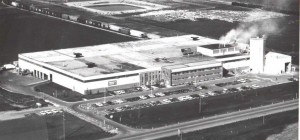Owens Corning Builds a Brighter Future
At Owens Corning, pink really is green.
The company, who transformed residential and commercial building markets 75 years ago with fiberglass and fiberglass insulation, is now focused on ways to improve products and processes while shrinking their environmental footprint.
“In 2010, we altered our production, switching from formaldehyde and ammonia based binders to more organic materials,” says Environmental Health and Safety Leader, Robert Sharpe. “Our EcoTouch line offers superior insulating properties and is better for the environment.”
The innovative pink product is made with 99 percent natural materials and includes local recycled bottles and jars from the Edmonton Waste Management Centre.
“Recycled glass makes up 85 percent of our insulation,” says Sharpe. “Last year we purchased nearly 29,000 tonnes of crushed glass for our operations.”
The crushed glass is melted and spun into fiberglass before an organic binder is added. After some time baking in a large oven, the distinctly coloured product is ready to be cut to size.
The decision to make use of local recycled materials is good for the environment and for business.
“EcoTouch is a more environmentally sustainable product,” explains Sharpe. “And since recycled glass requires less energy to melt, our production efficiency has improved significantly.”
The switch to the superior insulation line has had an impact on the company’s toxic air emissions intensity, decreasing 44 per cent since 2010. Operations related greenhouse gas intensity has also dropped by 12 percent.
Owens Corning is delivering on its pledge to continually reduce environmental emissions and to ensure responsible resource use.
“At our Edmonton plant, we reuse all our waste water,” says Sharpe. “The only thing that leaves this site is sewer from the toilets and showers.”
The company also collects rainwater from a portion of its roof for use in the manufacturing process. And inside the facility, timers have been installed and all the lighting has been replaced with low-energy bulbs.
“We are one of the leanest running Owens Corning plants in the world,” says Sharpe.
As the company honors its commitment to incorporate sustainability into everything it does, it continues to find time to give back to local communities.
“We are huge supporters of the Habitat for Humanity program and other initiatives for those in need,” says Sharpe. “Charitable contributions, donation of building materials and volunteering our time, we are happy to help. ”
As a member of the Strathcona Industrial Association (SIA), Owens Corning is committed to environmental performance, safety and community wellbeing.
Together, SIA members are ensuring heavy industry operators not only lead with responsible and sustainable policies and practices, but that they act as environmental stewards at every step of the way. SIA is greening our capital region.
Owens Corning Builds a Brighter Future
At Owens Corning, pink really is green.
The company, who transformed residential and commercial building markets 75 years ago with fiberglass and fiberglass insulation, is now focused on ways to improve products and processes while shrinking their environmental footprint.
“In 2010, we altered our production, switching from formaldehyde and ammonia based binders to more organic materials,” says Environmental Health and Safety Leader, Robert Sharpe. “Our EcoTouch line offers superior insulating properties and is better for the environment.”
The innovative pink product is made with 99 percent natural materials and includes local recycled bottles and jars from the Edmonton Waste Management Centre.
“Recycled glass makes up 85 percent of our insulation,” says Sharpe. “Last year we purchased nearly 29,000 tonnes of crushed glass for our operations.”
The crushed glass is melted and spun into fiberglass before an organic binder is added. After some time baking in a large oven, the distinctly coloured product is ready to be cut to size.
The decision to make use of local recycled materials is good for the environment and for business.
“EcoTouch is a more environmentally sustainable product,” explains Sharpe. “And since recycled glass requires less energy to melt, our production efficiency has improved significantly.”
The switch to the superior insulation line has had an impact on the company’s toxic air emissions intensity, decreasing 44 per cent since 2010. Operations related greenhouse gas intensity has also dropped by 12 percent.
Owens Corning is delivering on its pledge to continually reduce environmental emissions and to ensure responsible resource use.
“At our Edmonton plant, we reuse all our waste water,” says Sharpe. “The only thing that leaves this site is sewer from the toilets and showers.”
The company also collects rainwater from a portion of its roof for use in the manufacturing process. And inside the facility, timers have been installed and all the lighting has been replaced with low-energy bulbs.
“We are one of the leanest running Owens Corning plants in the world,” says Sharpe.
As the company honors its commitment to incorporate sustainability into everything it does, it continues to find time to give back to local communities.
“We are huge supporters of the Habitat for Humanity program and other initiatives for those in need,” says Sharpe. “Charitable contributions, donation of building materials and volunteering our time, we are happy to help. ”
As a member of the Strathcona Industrial Association (SIA), Owens Corning is committed to environmental performance, safety and community wellbeing.
Together, SIA members are ensuring heavy industry operators not only lead with responsible and sustainable policies and practices, but that they act as environmental stewards at every step of the way. SIA is greening our capital region.

